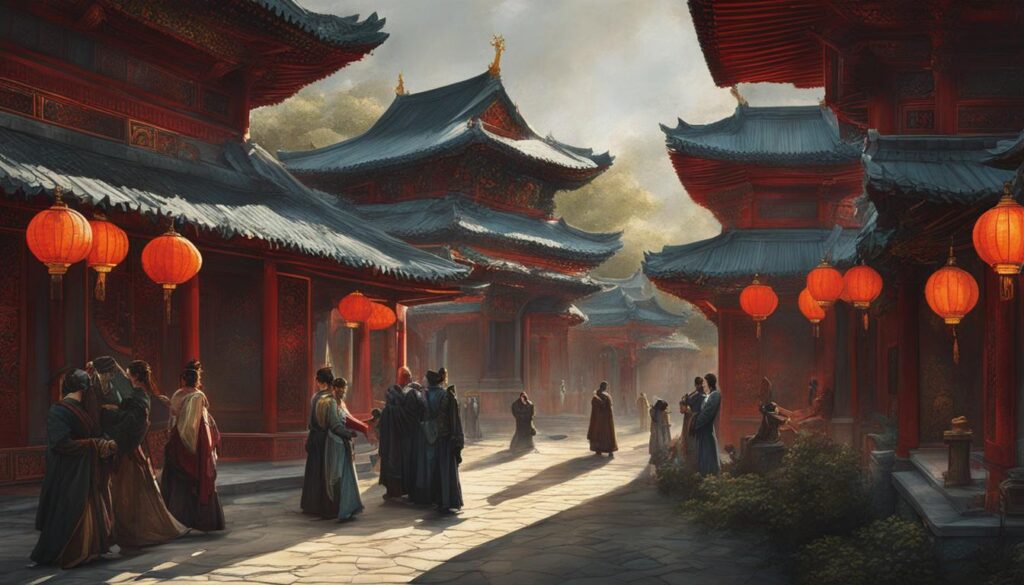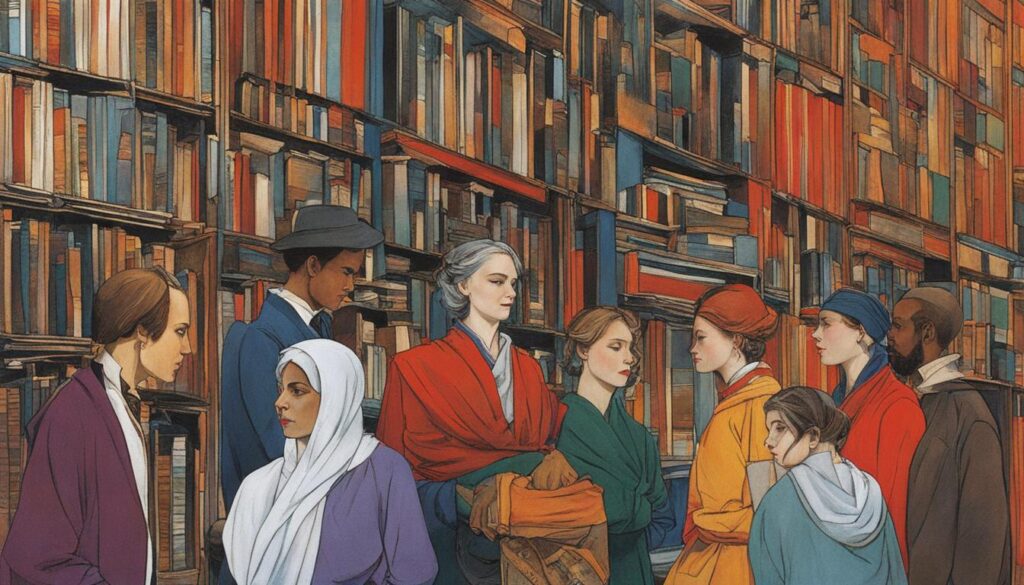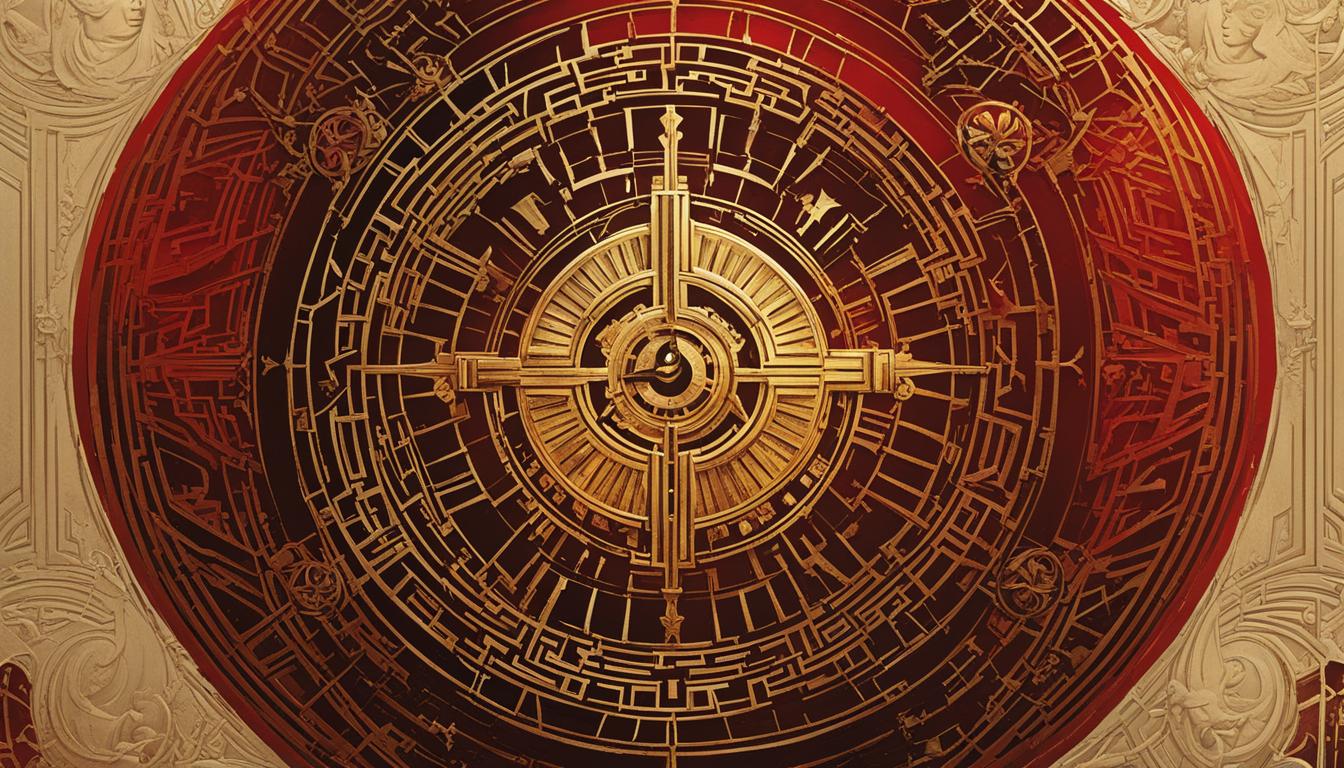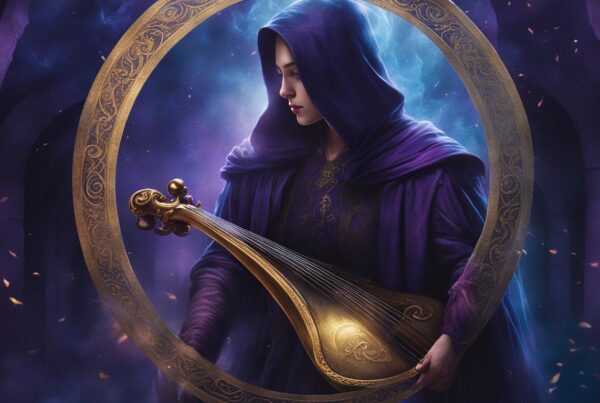In the realm of literary fiction, there are works that capture the essence of an era, subtly weaving through the fabric of social intricacies and personal ventures. Claire Messud‘s acclaimed contemporary novel, “The Emperor’s Children,” stands as a benchmark of such narrative prowess. This book analysis zooms in on the intersecting lives of three friends in the throes of personal definition and the search for meaning in the bustling landscape of New York City. Here, ambition and morality clash and dance, presenting a tableau rich with complexity and ripe for a profound literary critique.
As we unravel the layers of Messud’s characters and their ethical quandaries, readers will find a mirror to the age-old debate of what it means to lead a successful life against the backdrop of rampant idealism and silent challenges. The dissection of these narrative threads invites a reflection on the constraints and liberations of social expectation, the ever-relevant pursuit of personal fulfilment, and the quiet moments that define the cores of our being.
At the heart of this exploration lies a keen understanding that Messud’s work is more than just a story—it is a critical examination of the textures that compose modern life and the silent echoes left by pivotal historical moments. As we delve further into “The Emperor’s Children,” prepare to embark on a journey that extends beyond the pages, into the depths where fiction aligns with the realities we all grapple with. Let the analysis begin.
Introducing “The Emperor’s Children” by Claire Messud
Immerse yourself in the intricate tapestry of life that is “The Emperor’s Children”, Claire Messud’s esteemed character-driven novel. This sophisticated storytelling piece is not only a vivid portrayal of New York City but also an introspective look at the lives intertwined within post-9/11 fiction.
Renowned for her astute psychological insights, Claire Messud paints a complex picture of ambition and identity through the eyes of her richly developed characters. “The Emperor’s Children” takes us on a journey with three friends whose intertwined destinies reflect the broader existential moods of an era, embodying the nuanced anxieties and aspirations of a generation.
Set against the majestic backdrop of a pre-and-post-September 11th New York, readers discover a gripping narrative that deftly captures the zeitgeist of the epoch. The city itself emerges as a character, shaping and being shaped by the individuals within its vast expanse. The novel’s setting in the storied concrete landscape further cements its status as an exemplary piece of post-9/11 fiction.
The following synopsis overviews the plot without divulging key twists, preserving the novel’s myriad revelations for new and returning readers alike:
In the months leading up to, and following the cataclysmic fall of the Twin Towers, a group of ambitious characters finds their lives spiraling in unexpected directions. Their interlocking stories, filled with personal ambition and societal critique, prove as transformative as the historical events unfolding around them.
The novel consistently earns accolades for its exploration of themes such as the pursuit of greatness, the complexity of friendships, and the moral dilemmas that pepper our charted and uncharted courses alike. Readers are invited to delve into this seminal work, experiencing the compelling draw of what has become a cornerstone in the canon of Claire Messud books.
| Claire Messud’s Craftsmanship | Manifestations in “The Emperor’s Children” |
|---|---|
| Character Development | Deep psychological profiles and transformation of key figures |
| Setting as a Character | New York City depicted as a living, breathing entity |
| Thematic Depth | Dissecting the nature of success and morality in a post-9/11 world |
| Narrative Complexity | Multiple interwoven storylines offering a panoramic view of urban life |
Through Claire Messud’s lens, we behold a microcosm that is as endearingly flawed as it is emblematic of the larger human condition. As her characters stride, stumble, and navigate their respective paths, “The Emperor’s Children” stands as a remarkable study in narrative sophistication, forever resonating with readers who seek both the shadows and the light in the everyday.
Exploring the Intricate Character Dynamics
In the journey through “The Emperor’s Children”, we not only encounter a vivid portrait of life but also gain insight into the deeply-woven fabric of the protagonists’ experiences. From their personal growth to the aspirations that drive them forward, each character is crafted with a meticulous attention that invites thorough character analysis. This section delves into the narrative development, offering a closer look at the protagonists, the evolution of their friendships, and their fluctuating life goals tinged with both professional ambition and the stark realism of potential failure.
Profiles of the Protagonists
The complexity of Messud’s protagonists stems from their layered personalities and diverse backgrounds. Each is navigating the challenging waters of personal expectations and societal pressures, carving out spaces for their identities and desires. The protagonists’ life goals are not just backdrops but are pivotal in the narrative development, forging a story that explores the various dimensions of ambition and the pursuit of meaning within the chaotic tapestry of New York life.
Interpersonal Relationships and Development
Friendship serves as a central theme in the novel, acting as a catalyst for significant personal growth. The relationships among the characters are a testament to the vicissitudes of trust, loyalty, and understanding in the face of life’s oscillating fortunes. These ties create a complex web that further accentuates the protagonists’ evolution and the choices they make in a world that often seems beyond their control.
Portrayal of Ambition and Failure
The nuanced portrayal of both professional ambition and the fear of failure speaks to the core of the human condition. The characters’ arcs are a reflective microcosm of broader societal aspirations and the inherent risks that accompany the pursuit of lofty goals. The narrative development skillfully interweaves moments of triumph with the humbling realities of setbacks, creating an authentic exploration of success and its shadows.

| Character Aspect | Manifestation in Personal Growth | Manifestation in Professional Ambition |
|---|---|---|
| Motivations | Deep reflection and self-awareness | Drive to succeed in a competitive landscape |
| Strengths | Adaptability and resilience | Strategic thinking and decisiveness |
| Weaknesses | Self-doubt and overanalysis | Fear of failure and its implications |
| Life Goals | Pursuit of happiness and fulfillment | Establishment of a lasting legacy |
| Relationship Dynamics | Evolution through shared experiences | Networks of influence and mentorship |
Claire Messud’s Narrative Style and Structure
The crafting of “The Emperor’s Children” showcases Claire Messud’s ability to weave an innovative narrative that captivates readers through its sophistication and depth. Through her adept use of multi-perspective narrative, Messud allows the audience to delve into the intimate thought processes and experiences of a diverse cast of characters. This storytelling choice enriches the novel with a multiplicity of views, mirroring the complexities of real life and further reinforcing the authenticity of the depicted scenarios.
One of the most distinctive features of Claire Messud’s writing style is her seamless shift between the third-person omniscient viewpoint and the internal contemplations of her nuanced characters. The impact these shifts have on the overall pacing of the story is monumental, fostering a compelling rhythm that maintains the reader’s engagement and provides a rich, textured exploration of each character’s psyche.
| Aspect of Narrative | Relevance to “The Emperor’s Children” |
|---|---|
| Character Depth | Multi-dimensional characters with intersecting storylines. |
| Narrative Technique | Interchanging perspectives adding layers to the plot. |
| Pacing | Controlled ebb and flow that engages readers throughout. |
Messud’s construction of the narrative arc, with its careful progression and crescendos, showcases an intricate understanding of the storytelling craft. Her literary finesse is evident in the way subplots are interwoven with the primary narrative thread, never eclipsing the central themes but rather, enhancing them. Moreover, the implicit commentary she integrates within the narrative contours does not just serve the storyline but also sparks introspection.
In the context of modern literature, the value of such an innovative narrative as displayed in Claire Messud’s work cannot be overstated. It is a testament to her ability as a storyteller and her conscientious approach to contemporary writing, reflecting not just a story to be told but an experience to be felt and pondered upon.
Themes of Success and Morality in a Post-9/11 New York
The novel “The Emperor’s Children” by Claire Messud delves deeply into the intersection of individual aspiration and the moral quandaries that arise within the context of life in New York, particularly under the long shadow cast by the events of 9/11. This section will explore these intertwined themes by examining how the characters’ quest for success reflects personal and societal pressures and how their choices are complicated by the ethical landscape of a world forever altered by tragedy.
Dissecting the Pursuit of Greatness
The pursuit of success is a central driver for the novel’s characters, who navigate complex emotional and societal landscapes in their quests for recognition and greatness. These highly ambitious characters face the challenges of an evolving New York, where the promise of success clashes with the stark realities of a post-9/11 world.
Impact of Historical Events on Personal Lives
Historical events, particularly those as significant as 9/11, inevitably leave an indelible mark on individuals and society. Following the tragedy, the characters find themselves reassessing their lives and priorities, suggesting that the pursuit of personal success cannot be detached from the collective experiences of their time and place.
Moral Complexities and Choices of the Characters
In the wake of the post-9/11 reality, the ethical decisions made by the characters are foregrounded. They encounter moral crossroads where personal ambition may conflict with the expectations or well-being of others. This dimension of the narrative probes the delicate balance between self-advancement and ethical conduct in a complex, interconnected world.
Social Commentary and Satire in “The Emperor’s Children”
The novel “The Emperor’s Children” by Claire Messud presents a scathing social critique wrapped in layers of satire, unmasking the pretensions of intellectualism, dissecting class dynamics, and reflecting on the paradoxes of urban life. Through a vivid portrayal of affluent New Yorkers, Messud underscores the pervasive media influence and the often-compromised field of contemporary journalism.
Depiction of Intellectual Elitism
In the fabric of the novel, the threads of intellectual elitism are woven with dexterity. Characters exhibit a veneer of sophistication, which belies the hollowness of their convictions. This facet of urban life reveals a culture steeped in appearance rather than substance, inviting readers to question the true value of self-proclaimed intellectuality.
Class and Wealth in Urban Society
Through biting satire, Messud’s novel unpacks the intricate interplay between class and wealth, painting an incisive picture of inequality that besets the very heart of metropolitan existence. The narrative threads a complex tapestry that reflects the often unseen, yet deeply felt, barriers erected by socio-economic status in urban society.
Critique of Media and Journalism Culture
“The Emperor’s Children” casts a critical eye over the realms of media and journalism, highlighting the dichotomy between reporting integrity and the pursuit of sensationalism. As the novel unfolds, the role of media as an amplifier of societal values and issues, as well as its capacity to shape public discourse, becomes a central motif underscoring the profound media influence in our daily lives.
| Aspect | Depiction in the Novel | Impact on Society |
|---|---|---|
| Intellectual Elitism | Characters’ superficial intellectuality masking insecurities and hollow ethics. | Promotes a culture of pretense over authentic knowledge and wisdom. |
| Class Dynamics | Implicit societal hierarchies influencing characters’ interactions and prospects. | Exposes the structural limitations and societal pressures imposed by economic status. |
| Journalism | Critique of media’s chase for sensational stories at the expense of genuine journalism. | Challenges readers to discern the truth from the constructed narratives in news media. |
Comparative Analysis with Other Works by Claire Messud
Drawing a literary comparison between “The Emperor’s Children” and other Claire Messud novels reveals a tapestry woven with intricate themes and an unmistakable authorial style. Readers and critics often marvel at the thematic similarities across her works, particularly how she delves into the complexities of human relationships and the personal struggles within differing socio-cultural backdrops.
Messud’s novels frequently navigate the terrain of self-discovery and the search for authenticity. They create a platform on which the intricate dances of family, friendship, and societal expectations are performed. To provide a richer understanding of the shared narratives found within her books, a side-by-side analysis of selected novels is presented below:

| Novel | Main Themes | Authorial Style |
|---|---|---|
| The Last Life | Family legacy, identity, displacement | Lyrical prose, introspective narration |
| The Woman Upstairs | Artistic ambition, female agency, betrayal | Intense first-person POV, emotional depth |
| The Emperor’s Children | Ambition, morality, pre- and post-9/11 life | Multiple perspectives, sharp social commentary |
| The Burning Girl | Adolescence, friendship, the nature of stories | Reflective and evocative storytelling |
Whether exploring the echoing chambers of a fraying familial lineage in “The Last Life,” the piercing cry for recognition in “The Woman Upstairs,” or the nuances of formative relationships in “The Burning Girl,” Messud’s narrative strategy maintains a vivid introspection. It is her commitment to exposing the raw edge of her characters’ psyches that consistently establishes a profound connection with the reader. The thematic similarities, expertly served through distinct narrative voices and a psychologically astute writing style, affirm Messud’s prowess in constructing multi-layered stories that resonate with earnest human experience.
By juxtaposing how these elements play out across her body of work, one can discern both the breadth and depth of Messud’s literary contributions. The potent combination of rich thematic exploration and stylistic consistency defines her oeuvre, making Claire Messud a staple in the realm of serious contemporary literature.
Critical Reception and Cultural Impact of the Novel
Upon its release, “The Emperor’s Children” quickly garnered critical acclaim, cementing its status as a bestseller and confirming Claire Messud’s prowess in creating a narrative with cultural resonance. The novel not only penetrated the literary scene with its robust storytelling but also sparked conversations on the intricacies of life’s moral quandaries.
Literary Accolades and Awards
The literary impact of Messud’s work was recognized by numerous awards bodies, with critics praising her sharp insight and eloquent prose. The novel’s achievement in capturing the complexities of its era was reflected in its nominations and accolades, bridging the gap between fiction and soulful commentary on contemporary life.
The Novel’s Legacy and Influence
Solidifying its place in modern literature, “The Emperor’s Children” continues to be a point of reference for discussions on ambition, moral uncertainty, and the human condition post-9/11. Its legacy extends beyond the pages, influencing both readers and writers with its profound portrayal of societal aspirations amidst personal discovery.
Reader Responses and Reviews
The dimensionality of “The Emperor’s Children” is also reflected in the breadth of reader reviews. Bibliophiles and casual readers alike were drawn to its characters and the authenticity of their struggles, sharing their insights across various platforms, from literary blogs to book clubs. These personal anecdotes added to the chorus of professional critiques, painting a complete picture of the novel’s reception.
Audiobook Review: Immersing in the Narration of “The Emperor’s Children”
When it comes to enjoying literature in our modern age, the medium matters nearly as much as the message. This rings especially true with the audiobook production of “The Emperor’s Children.” Diving into this audiobook review, it’s clear that the narrative performance plays a pivotal role in bringing Claire Messud’s intricate novel to life. The narrators’ voices, infused with affectation and nuance, transport listeners straight to the heart of New York City, with its bustling streets and the complex lives that pulse within.
The audiobook’s production quality deserves acclaim for its clarity and attention to detail, fostering a listening experience that intertwines seamlessly with the listeners’ imagination. Listeners are invited to experience the ambition and moral uncertainties of the novel’s richly developed characters in a format that allows for a unique relationship with the narrative. Whether you’re embroiled in the characters’ tumultuous lives or the subtler moments of introspection, the audiobook envelops you in a world where the spoken word reigns supreme.
In conclusion, the audiobook version of “The Emperor’s Children” epitomizes the heights a narrative performance can reach and the immersive potential of audiobook production. As both a complement to and a distinct experience from reading the novel, this listening experience merits attention from audiophiles and literary enthusiasts alike. It not only captures the essence of Messud’s storytelling but also illuminates its themes and characters in a resonant, memorable form.



